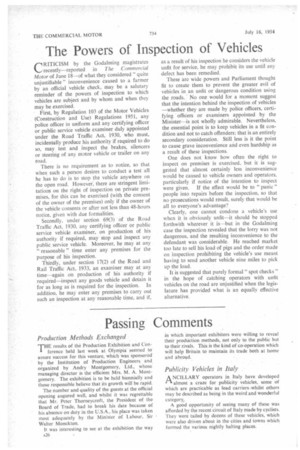The Powers of Inspection of Vehicles C RITICISM by the Godalming
Page 28

If you've noticed an error in this article please click here to report it so we can fix it.
magistrates „....recently—reported in The Commercial Motor of June 18—of what they considered "quite unjustifiable" inconvenience caused to a farmer by an official vehicle check, may be a salutary reminder of the powers of inspection to which vehicles are subject and by whom and when they may be exercised.
First, by Regulation 103 of the Motor Vehicles (Construction and Use) Regulations 1951, any police officer in uniform and any certifying officer or public service vehicle examiner duly appointed under the Road Traffic Act, 1930, who must, incidentally produce his authority if required to do so, may test and inspect the brakes, silencers or steering of any motor vehicle or trailer on any road.
There is no requirement as to notice, so that when such a person desires to conduct a test all he has to do is to stop the vehicle anywhere on the open road. However, there are stringent limitations on the right of inspection on private premises, for this can be exercised (with the consent of the owner of the premises) only if the owner of the vehicle consents or after not less than 48-hours notice, given with due formalities.
Secondly, under section 69(3) of the Road Traffic Act, 1930, any certifying officer or public service vehicle examiner, on production of his authority if required, may stop and inspect any public service vehicle. Moreover, he may at any " reasonable " time enter any premises for the purpose of his inspection.
Thirdly, under section 17(2) of the Road and Rail Traffic Act, 1933, an examiner may at any time—again on production of his authority if required—inspect any goods vehicle and detain it for as long as is required for the inspection. In addition. he may enter any premises to carry out such an inspection at any reasonable time, and if. as a result of his inspection he considers the vehicle unfit for service, he may prohibit its use until any defect has been remedied.
These are wide powers and Parliament thought fit to create them to prevent the greater evil of vehicles in an unfit or dangerous condition using the roads. No one would for a moment suggest that the intention behind the inspection of vehicles —whether they are made by police officers, certifying officers or examiners appointed by the Minister—is not wholly admirable. Nevertheless, the essential point is to keep vehicles in a fit condition and not to catch offenders; that is an entirely secondary consideration. Still less is it the point to cause grave inconvenience and even hardship as a result of these inspections.
One does not know how often the right to inspect on premises is exercised, but it is suggested that almost certainly less inconvenience would be caused to vehicle owners and operators, particularly if notice of the intention to inspect were given. If the effect would be to " panic " people into repairs before the inspection, so that no prosecutions would result, surely that would be all to everyone's advantage?
Clearly, one cannot condone a vehicle's use when it is obviously unfit—it should be stopped forthwith wherever it is—but in the Godalming case the inspection revealed that the lorry was not dangerous, and the resulting inconvenience to the defendant was considerable. He reached market too late to sell his load of pigs and the order made on inspection prohibiting the vehicle's use meant having to send another vehicle nine miles to pick up the load.
It is suggested that purely formal "spot checks" in the hope of catching operators with unfit vehicles on the road are unjustified when the legislature has provided what is an equally effective alternative.




























































































